Lochhead on Marketing
193 Your Biggest Competition Is Thinking You Have Competition
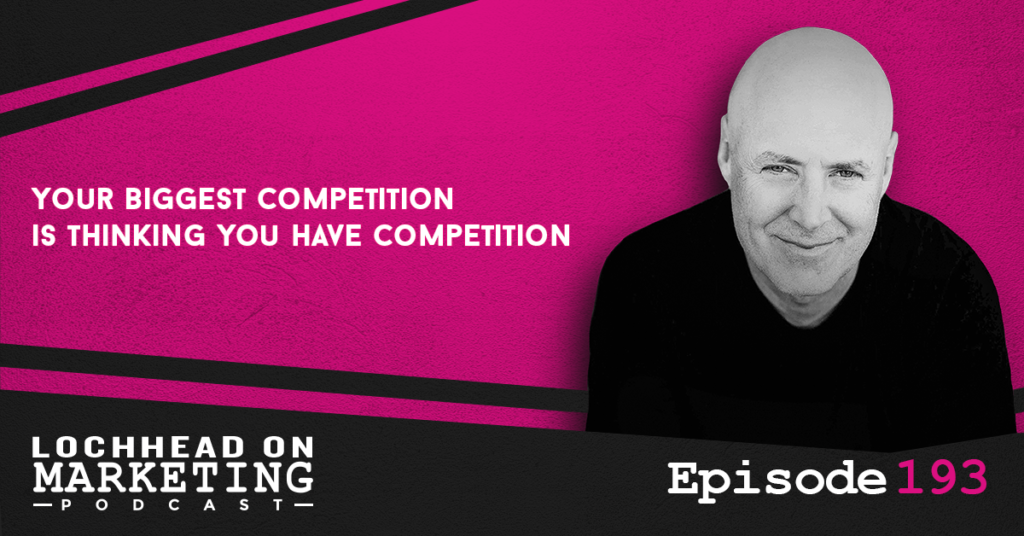
Podcast (lochheadonmarketing): Play in new window | Download (Duration: 15:53 — 10.9MB) | Embed
Subscribe: Apple Podcasts | Spotify | RSS | More
On this episode of Lochhead on Marketing, let’s talk about a trap that most budding Category Designers fall for, and that’s thinking about competition.
Welcome to Lochhead on Marketing. The number one charting marketing podcast for marketers, category designers, and entrepreneurs with a different mind.
Feature Battle vs Category Battle
Christopher shares a story of a company who consulted with him, regarding a rising competitor in the market. Most companies’ knee-jerk reaction would be to compete; take on the same messaging, and muscle out the competitor while it’s still early.
But in the end, they opted to do the opposite – they did not compete, at least not in the usual sense of it. Rather than doing a Feature Battle to see who has the better additions, messaging, and branding, they focused more on their product. They went the Category Battle route instead, carving out a large portion of the market with their improved category, and leaving the others battling for the remaining scraps.
Competition Derangement Syndrome
The apparent simplicity of the concept begs the question: why do most companies fail to adopt it? The answer lies in what could be termed “Competition Derangement Syndrome.” Many companies, instead of pioneering their own unique category to dominate, fall into a pattern of waiting for new categories to emerge before entering the fray.
Alternatively, larger corporations may opt to eliminate competition by acquiring the reigning Category King. However, this strategy essentially involves investing a significant sum to pave the way for the emergence of the next category, which their competitors will inevitably exploit. This cycle repeats itself, with each new category birthing fresh contenders, until the tables turn and the once-acquirer finds itself being acquired. Thus, the cycle perpetuates, underscoring the failure of many companies to break free from the pattern of reactive competition.
Competition vs Consumer
This does not mean that you avoid competing altogether. We are all driven by our will to fight, and business is not so different in that regard. But rather than going down to their level to fight on “equal” grounds, why not make it so that you are always thinking a few steps ahead, rather than slowing down just to match up to them.
And if they seem to be catching up to you at a faster rate, trying to adopt their strategies just means maintaining the status quo. It also sends the wrong message to the consumers, because you are adjusting for the competition, and not for them.
In the end, it’s better to achieve market dominance by consumer trust rather than just having the competitive edge, because there will always be someone that will try to compete. But as long as your consumers know that your product continues to improve for consumer satisfaction, then it will always remain as the Category King.
Bio
Don’t forget to grab a copy (or gift!) of one of our best-selling books:
Snow Leopard: How Legendary Writers Create A Category Of One
The Category Design Toolkit: Beyond Marketing: 15 Frameworks For Creating & Dominating Your Niche
A Marketer’s Guide To Category Design: How To Escape The “Better” Trap, Dam The Demand, And Launch A Lightning Strike Strategy
 The 22 Laws of Category Design: Name & Claim Your Niche, Share Your POV, And Move The World From Where It Is To Somewhere Different
The 22 Laws of Category Design: Name & Claim Your Niche, Share Your POV, And Move The World From Where It Is To Somewhere Different
We hope you enjoyed this episode of Lochhead on Marketing™! Christopher loves hearing from his listeners. Feel free to email him, connect on Facebook, Twitter, Instagram, and subscribe on iTunes!
192 Stop Trying to Fit In!
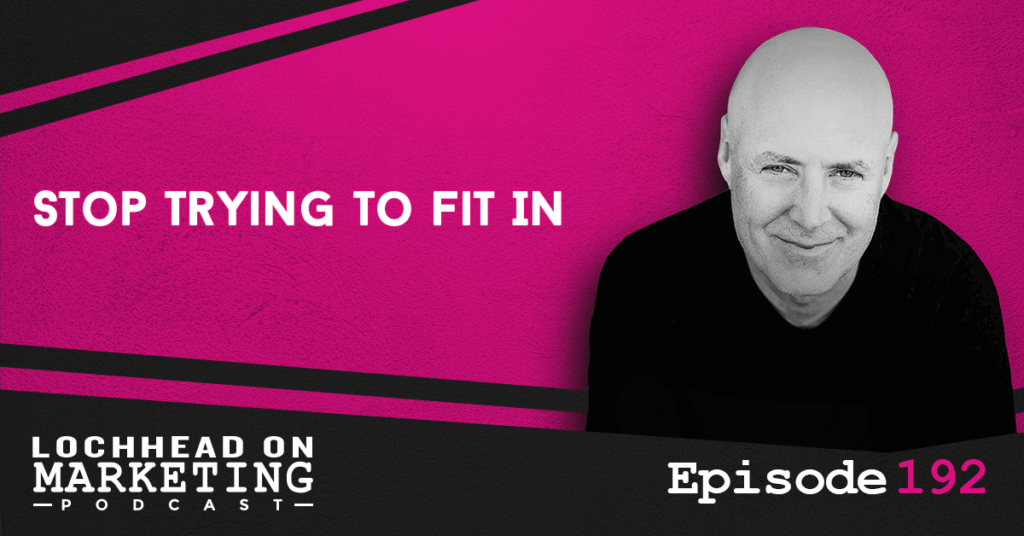
Podcast (lochheadonmarketing): Play in new window | Download (Duration: 10:49 — 7.4MB) | Embed
Subscribe: Apple Podcasts | Spotify | RSS | More
On this episode of Lochhead on Marketing, let’s talk about why it’s time to stop trying to fit in.
Welcome to Lochhead on Marketing. The number one charting marketing podcast for marketers, category designers, and entrepreneurs with a different mind.
Everyone Wants to Fit In
There’s an ongoing trend in the business, startup and marketing world of companies trying to fit in. There have been studies that indicate that among the B2B tech space, as many as 70% of the brands are blue.
This urge to fit in seems to stem from a combination of several factors. One of which is that companies are trying to compete in the same market, and they end up adopting marketing trends that seems to be working, which just makes them look like carbon copies of each other.
The second part is the current culture of people seemingly being offended by the simplest things, or if something does not align with their beliefs. So companies try to be as non-offensive as possible, which in turn just make their brand into something bland.
“The overall strategy in people’s marketing, and frankly, in many people’s careers, is to achieve Marriott lobby status. So what’s a Marriott lobby? Marriott lobby is nice; It’s very functional. It’s effective. And it’s bland. It’s forgettable. And nobody ever said, “Wow, that was a fucking legendary Marriott lobby.””
– Christopher Lochhead
The Primordial Need to Fit In
We get it: people have a primordial urge to stay in groups. We are pack animals, after all. Staying in a group is safe, staying in a group is comfortable. And having something in common lets us relate personally to a group, which is why marketing companies aim for those traits to relate to their market.
But at the end of the day, nobody legendary ever fit in. Because when you try to fit in, you become part of that whole, rather than something that defines it. And rather than companies trying to make their own markets and circles, they are being content in staying in the same circle, and competing for an ever-shrinking part of it, as more and more companies try to muscle their way in.
So be legendary, and start being different.
“And then I say fuck that, I’m going to follow my different. I’m going to focus on the things that are most meaningful to me, and most importantly, are going to make the biggest difference.”
– Christopher Lochhead
Bio
Don’t forget to grab a copy (or gift!) of one of our best-selling books:
Snow Leopard: How Legendary Writers Create A Category Of One
The Category Design Toolkit: Beyond Marketing: 15 Frameworks For Creating & Dominating Your Niche
A Marketer’s Guide To Category Design: How To Escape The “Better” Trap, Dam The Demand, And Launch A Lightning Strike Strategy
 The 22 Laws of Category Design: Name & Claim Your Niche, Share Your POV, And Move The World From Where It Is To Somewhere Different
The 22 Laws of Category Design: Name & Claim Your Niche, Share Your POV, And Move The World From Where It Is To Somewhere Different
We hope you enjoyed this episode of Lochhead on Marketing™! Christopher loves hearing from his listeners. Feel free to email him, connect on Facebook, Twitter, Instagram, and subscribe on iTunes!
191 Gemini Can Testify It’s A Bland Rebrand!
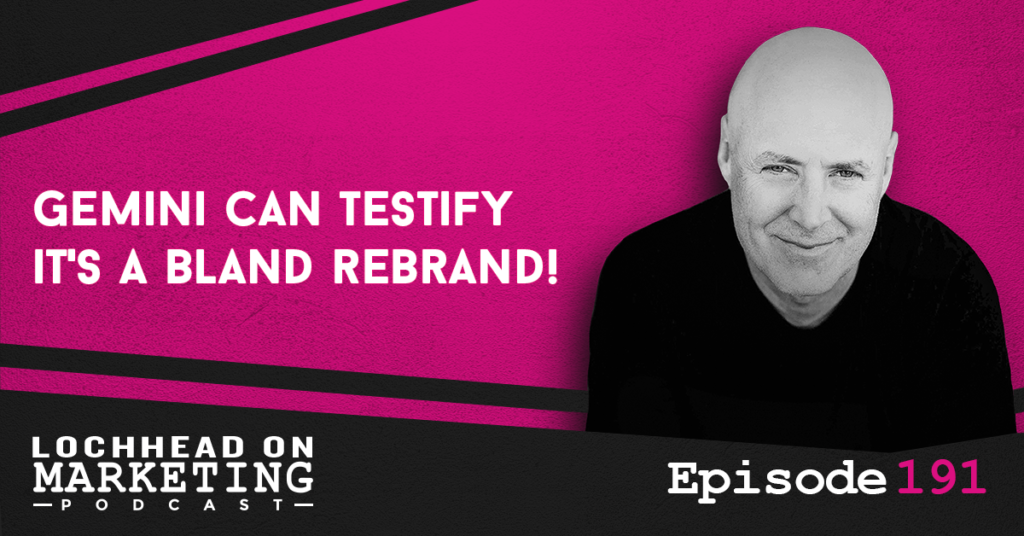
Podcast (lochheadonmarketing): Play in new window | Download (Duration: 12:28 — 8.6MB) | Embed
Subscribe: Apple Podcasts | Spotify | RSS | More
Today on Lochhead on Marketing, we talk about the good way and the bad way to rebrand. And wat better to use as an example than the recent Gemini AI rebrand by Google.
Welcome to Lochhead on Marketing. The number one charting marketing podcast for marketers, category designers, and entrepreneurs with a different mind.
The Good Reason to “Rebrand”
Before we proceed with the main topic at hand, let’s first have a good example of when to “rebrand”.
There’s a company called Chirp that sells foam rollers, which is used by athletes for training their muscles and easing soreness. But after some time, a new category was invented that was adjacent to their market, the percussion massager / gun.
Rather than just create their own version of percussion gun, Chirp went ahead and combined their foam rollers into this new category, essentially making a new category, the rolling percussive massager, for themselves.
The Bad Reason to “Rebrand”: Google’s Gemini
So why did we tell you that story? Because Google is doing the exact opposite of that, always going for the “Compete in the market” model rather than making their own market. And it could be seen with their latest endeavor in AI, Bard now rebranded as Gemini.
So, why did Google make this move? While we can’t say for certain, we can infer their motives. Essentially, they directly challenged ChatGPT and came up short. Now, they’re revamping Bard to give it a “fresh start.” While that might be their goal, most marketing experts would tell you that it simply looks like Google is backing away from the competition and trying to repurpose their AI to make the best of the situation.
That in itself is a problem, but there’s also the fact that Google doesn’t really do anything different than the reigning Category King of the market. This has been true with their forays in podcasts, social media, and their other services that are now defunct. They’re competing, instead of creating, which is what most companies do, and they’re fucked.
When to do a “Rebrand”
With that said, the best time to do a rebrand is if either you’re introducing a brand-new category as your main product, or revolutionizing one of your current ones by making a new category.
Rather than chasing after the tail of the Category Leader and competing for the remaining small chunk of the market, why not try doing something different? Because otherwise, you’ll just get your ass handed to you, just like what happened with Google Plus, Google Podcasts, and now, the unfortunate Google Gemini.
Bio
Don’t forget to grab a copy (or gift!) of one of our best-selling books:
Snow Leopard: How Legendary Writers Create A Category Of One
The Category Design Toolkit: Beyond Marketing: 15 Frameworks For Creating & Dominating Your Niche
A Marketer’s Guide To Category Design: How To Escape The “Better” Trap, Dam The Demand, And Launch A Lightning Strike Strategy
 The 22 Laws of Category Design: Name & Claim Your Niche, Share Your POV, And Move The World From Where It Is To Somewhere Different
The 22 Laws of Category Design: Name & Claim Your Niche, Share Your POV, And Move The World From Where It Is To Somewhere Different
We hope you enjoyed this episode of Lochhead on Marketing™! Christopher loves hearing from his listeners. Feel free to email him, connect on Facebook, Twitter, Instagram, and subscribe on iTunes!
190 How To Have A Legendary Career In Marketing with Ryan Alford of The Radcast
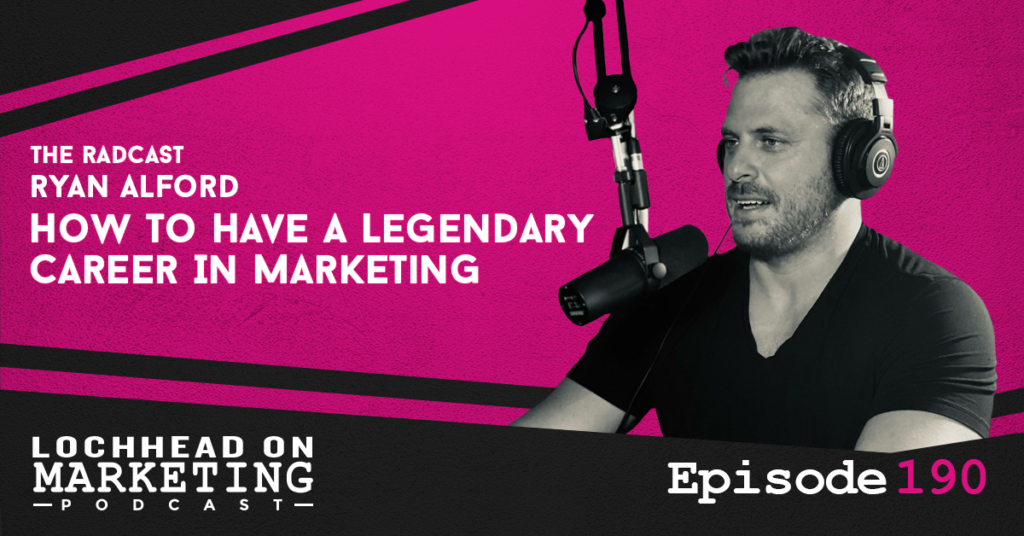
Podcast (lochheadonmarketing): Play in new window | Download (Duration: 1:02:23 — 42.8MB) | Embed
Subscribe: Apple Podcasts | Spotify | RSS | More
On this episode of Lochhead on Marketing, we have a very special episode with one of my favorite marketers, Ryan Alford.
Ryan Alford runs a digital marketing agency called Radical Marketing. He also has a great marketing podcast that I’ve been stoked to be a guest on called The Radcast, which is a top 25 Business and Marketing podcast. He’s just one of those guys I like talking about marketing with.
Today, we are going to talk about how to have a legendary marketing career. We also talk about why it is that many people in Marketing don’t view what they do as a craft that they’re working on their whole lives, and what happens when you do so.
Welcome to Lochhead on Marketing. The number one charting marketing podcast for marketers, category designers, and entrepreneurs with a different mind.
Ryan Alford on Marketing Careers and Current Industry Trends
Christopher and Ryan discuss the appeal of marketing careers, especially for younger individuals.
Ryan, with 20 years of experience, emphasizes the importance of creative thinking and adaptation in the face of industry changes like AI. He believes marketing offers opportunities for innovation and creativity, essential for standing out amidst a crowded field.
Christopher adds that many marketers don’t view their work as a craft, but rather as a job or set of skills, contrasting it with master surfboard shaping. Ryan, drawing on his own experience, sees marketing as a craft that requires honing skills over time, akin to his father’s craftsmanship. Both agree that when you love what you do, it doesn’t feel like work.
Ryan Alford on Marketing Skills and Adapting to Platform Changes
The two then discuss the evolving landscape of marketing skills and the need for adaptability. They highlight the importance of curiosity, continuous learning, and embracing change in navigating the industry’s shifts.
With the proliferation of digital platforms, they emphasize the challenge of staying updated and the risk of relying too heavily on platforms beyond marketers’ control. Despite these challenges, they underscore the enduring power of innovative ideas to capture attention and drive success. Christopher also cautions against shallow tactics focused solely on grabbing attention without meaningful content, using the wind feather in car dealerships and mall entrances as an example.
They advocate for a balance between leveraging new platforms and maintaining focus on substantive messaging to achieve marketing goals effectively.
Ryan Alford on Marketing Strategies and Generating Outcome
Christopher and Ryan discuss the importance of marketing strategies producing meaningful outcomes rather than mere attention-grabbing tactics. They emphasize the necessity of tying marketing efforts to revenue generation, highlighting the distinction between visibility campaigns and those that drive sales.
Ryan stresses that successful marketers focus on moving consumers from one perception to another, ultimately leading to sales.
They acknowledge the controversy surrounding this viewpoint, especially among marketers who resist being held accountable for tangible results.
Both agree that marketing is for those who embrace accountability and are committed to producing revenue, with Christopher noting that marketing allows for creative ideation that triggers sales, contrasting with the more direct approach of salesmanship.
To hear more from Ryan Alford and learn how to have a legendary career in Marketing, download and listen to this episode.
Bio
Links
Connect with Ryan Alford!
We hope you enjoyed this episode of Lochhead on Marketing™! Christopher loves hearing from his listeners. Feel free to email him, connect on Facebook, Twitter, Instagram, and subscribe on iTunes!
189 The Big Distribution Lie
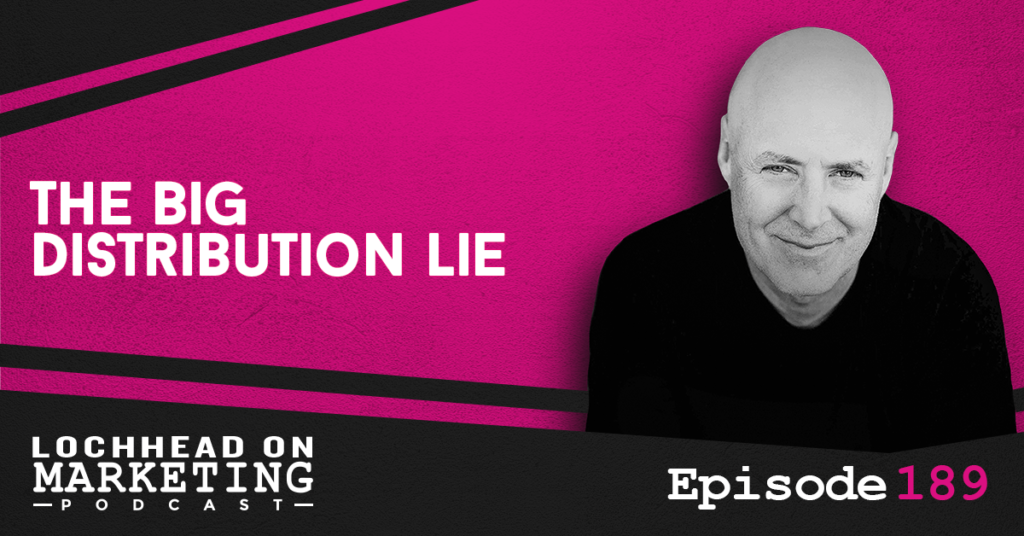
Podcast (lochheadonmarketing): Play in new window | Download (Duration: 7:07 — 4.9MB) | Embed
Subscribe: Apple Podcasts | Spotify | RSS | More
Happy new year to everyone, and we at Lochhead on Marketing hope that you’ve been having a good one so far. To start off the year, let us talk about the big Distribution Lie, why it is so, and what you really need for your new startup or project to make it big.
You see, in Silicon Valley, there has been an ever-increasingly large drumbeat that says the number one thing that a startup needs or that a new software launch of any kind needs is distribution. That if you can only get distribution, then you’d win, right? So, let’s test this.
Welcome to Lochhead on Marketing. The number one charting marketing podcast for marketers, category designers, and entrepreneurs with a different mind.
The Myth of Distribution as a Key to Success
For this discussion, let us use Google as an example. In 2018, Google launched Google Podcast as a competitor to the category king (Apple), and the current challenger (Spotify). On paper, Google Podcast should have the advantage: Google has a legendary distribution line with its 5 billion users and having a mailing and browsing platform that is widely popular worldwide.
And yet for some reason, Google Podcast is now at the brink of closing down in 2024. So why did it not beat out the category king, much less its challenger in this race?
Building the Category versus Muscling into the Market
Simply put, Google Podcast did not offer anything new that Apple Podcast or Spotify doesn’t already do. It was simply relying on the fact that on paper, it looks like the better product with a well-established distribution network to back it up.
Whereas Apple created the category, designed the space, and solved the “problem” that their product “solves”, thus cornering a big chunk of the market.
This is a mistake that happens over and over and over again, category design economics are clear, the company that designs the space is best positioned to dominate it and by dominated our primary research has shown that the company that designs the category, if they can execute over time, earns 76% of the total value created.
Doomed to Repeat Itself
Unfortunately, this is not the first time this has happened to Google. One big thing most people might remember is Google Plus, which was supposed to take down Facebook. And not only Google is susceptible to this, as different big tech companies have committed this mistake, because they believe they could just use their better distribution systems to take over a market, rather than creating their own to dominate.
So at the end of the day, no matter how good your product is, and how great your distribution advantage is: if you don’t design a new category, around a problem that matters to customers, it doesn’t matter how legendary your product is.
Bio
Don’t forget to grab a copy (or gift!) of one of our best-selling books:
Snow Leopard: How Legendary Writers Create A Category Of One
The Category Design Toolkit: Beyond Marketing: 15 Frameworks For Creating & Dominating Your Niche
A Marketer’s Guide To Category Design: How To Escape The “Better” Trap, Dam The Demand, And Launch A Lightning Strike Strategy
 The 22 Laws of Category Design: Name & Claim Your Niche, Share Your POV, And Move The World From Where It Is To Somewhere Different
The 22 Laws of Category Design: Name & Claim Your Niche, Share Your POV, And Move The World From Where It Is To Somewhere Different
We hope you enjoyed this episode of Lochhead on Marketing™! Christopher loves hearing from his listeners. Feel free to email him, connect on Facebook, Twitter, Instagram, and subscribe on iTunes!
188 A Wish for Different in 2024
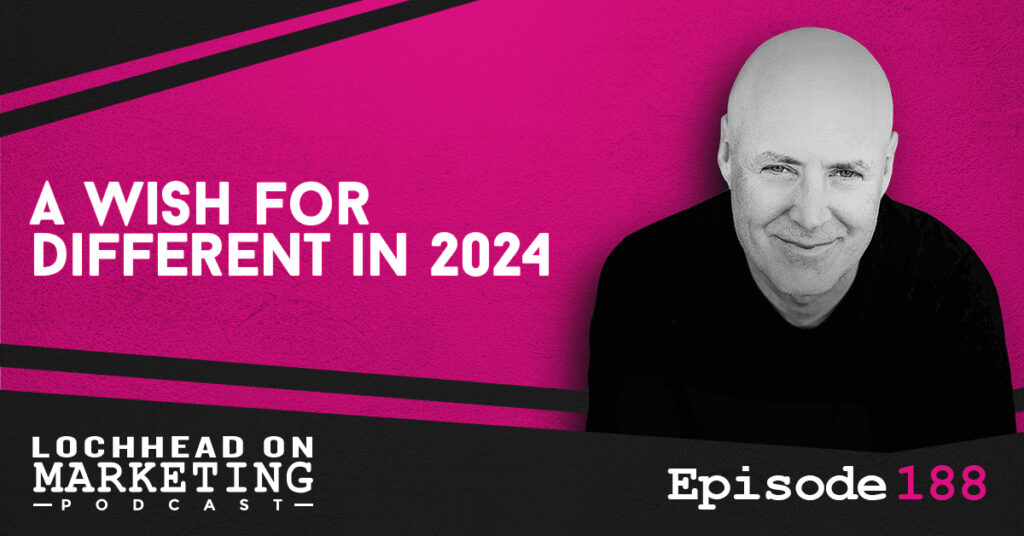
Podcast (lochheadonmarketing): Play in new window | Download (Duration: 45:45 — 31.4MB) | Embed
Subscribe: Apple Podcasts | Spotify | RSS | More
First and foremost, we at Lochhead on Marketing would like to wish everyone from the bottom of our hearts, happy holidays. Christopher Lochhead hopes that you have an opportunity to be with the people you love this time of year, and enjoy some happiness and peace.
That said, there seems to be a lot going on lately. Be it about antisemitism, diversity, equality, and inclusion, and sort of the core values that the United States will be governed by and will latch on to. So I wanted to take this time and have a talk between you and I.
You may not like what I will have to say, and that is all right. The important thing is that we have a good dialogue between us, and open ourselves to thinking Different does not always mean they hate you and your type of thinking.
As we head to 2024, that is my wish for the holiday season. That we have a breakthrough in real, authentic, civilized, thoughtful dialogue.
Welcome to Lochhead on Marketing. The number one charting marketing podcast for marketers, category designers, and entrepreneurs with a different mind.
Christopher Lochhead on LGBTQ+ rights over the years
Christopher shared a heartwarming story about a LinkedIn acquaintance, a marketing executive, who recently had a baby with her wife. They had a positive exchange about babies, and Christopher expressed genuine happiness for the couple.
“Around here, we think babies are fucking fantastic, especially when they’re born to good people who are committed to raising those children and loving knows children. What could be better than a great couple are a great group of folks who have a baby, love that baby, and do everything in their power to provide that child with a great life and enjoy that child. It’s wonderful.”
– Christopher Lochhead
Christopher then reflected on growing up around queer individuals, recalling the challenges they faced over the years. He emphasized the progress in societal acceptance of the queer community, highlighting the positive change that allows people to openly share personal milestones without fear of judgment.
That said, Christopher expressed joy for the LinkedIn acquaintance, appreciating that she can legally be herself and share her family news without hesitation, considering it a legendary step forward, especially in the United States.
Christopher Lochhead on mortgage discrimination
Christopher then talks about a CNN headline that revealed the systemic racism about the Navy Federal Credit Union’s discriminatory mortgage approval practices.
The report states that while over 75% of white applicants were approved for conventional home purchase mortgages, less than 50% of black applicants were approved under the same circumstances. Christopher condemns this as not just systemic racism but outright evil. He criticizes financial institutions like Wells Fargo for repeatedly facing charges related to racial discrimination without executives facing jail time. He emphasizes the urgent need to acknowledge and fight systemic racism for true equality and justice, citing the 14th Amendment of the US Constitution.
“This is racism right in front of us. And anybody who’s just anybody who cares about equality, and justice, and the pursuit of happiness for all must acknowledge that there is systemic racism against certain groups. There’s no doubt about that. And we need to fight it. We really need to fight it.”
– Christopher Lochhead
On Systemic Racism and DEI in society
Christopher expresses concern about the rise of hatred, particularly in the context of recent events, notably the conflict in the Middle East. He highlights the misunderstandings surrounding the October 7th events, emphasizing the severity of the situation and the explicit threat against Israel and the Jewish population.
Christopher is dismayed by the confusion and the lack of recognition for Israel’s right to defend itself. He shares a personal experience of a friend falling victim to violence and underscores the complexity of the situation, acknowledging the tragedy on both sides.
Christopher attributes the rise in hatred to the teachings of diversity, equity, and inclusion (DEI), which he suggests simplifies the world into oppressors and oppressed, fostering division and victimhood competitions rather than promoting genuine understanding and collaboration.
To hear more of Christopher Lochhead’s thoughts on 2023 and his wish for the coming year, download and listen to this episode.
Bio
Links
We hope you enjoyed this episode of Lochhead on Marketing™! Christopher loves hearing from his listeners. Feel free to email him, connect on Facebook, Twitter, Instagram, and subscribe on iTunes!
187 How To Become A Category Pirate | Christopher Lochhead on Lenny’s Podcast with Lenny Rachitsky

Podcast (lochheadonmarketing): Play in new window | Download (Duration: 1:48:49 — 74.7MB) | Embed
Subscribe: Apple Podcasts | Spotify | RSS | More
This week, we’re presenting to you Christopher Lochhead’s appearance on Lenny’s Podcast, hosted by Lenny Rachitsky.
Lenny Rachitsky runs the #1 Business Substack newsletter, Lenny’s Newsletter. It is legendary especially for people in tech marketing, product marketing, and startups. It’s so legendary that even Christopher pays for it. And now, he’s in it.
This is one of the more in-depth discussions Christopher has had with a very smart person about category design in a while. So settle in for a good listen and great lesson about category design.
Welcome to Lochhead on Marketing. The number one charting marketing podcast for marketers, category designers, and entrepreneurs with a different mind.
On taking the Good with the Bad
Lenny starts off the conversation by showing appreciation to Christopher’s extensive work, and jokingly adds that it was challenging to prepare for their conversation due to his numerous podcasts, books, and other content.
That said, Lenny noticed Christopher’s website displayed negative reviews prominently. When asked about it, Christopher explained his approach with humor, calling his team Category Pirates and embracing criticism. He believed it was essential for innovators not to fear criticism, citing examples of famous artists and musicians who faced initial negativity. Christopher displayed negative feedback to show the reality of creative work and to remind people not to take themselves too seriously.
Lenny admired Christopher’s ability to handle criticism and expressed the desire to adopt a similar mindset.
Lenny Rachitsky on how Lenny’s Newsletter came to be
Christopher Lochhead expressed admiration for Lenny’s branding choices, appreciating the simplicity of just being called “Lenny.” He found it endearing and highlighted that Lenny’s authenticity stood out in a world where many influencers create an aura of superiority.
Lenny shared that the name “Lenny’s Newsletter” was a default suggestion from Substack, and he never intended it to be a long-term commitment. Similarly, he struggled to find a different name for his podcast, wanting to avoid a self-centered approach.
But despite having his name in the branding, Christopher noted the content wasn’t self-centered; instead, it reflected Lenny’s genuine approach, unlike influencers who focus on creating envy. They both appreciated the authenticity in Lenny’s approach.
Lenny Rachitsky and Christopher Lochhead talk Category Creation
Lenny asked Christopher about category creation, a concept Christopher has championed over competition in existing markets.
Christopher explained how most people aim to compete by offering a better product or service in an existing category. However, legendary innovators don’t follow this path. They create entirely new categories, defining unique problems and solutions. Christopher emphasized that a single company in a category usually captures two-thirds of the market value, making category creation a lucrative strategy.
He cited Gojo Industries, creators of Purell, as an example. They didn’t just invent hand sanitizer; they redefined the problem of hand cleanliness, leading to a new market category. Christopher stressed the importance of focusing on problem-solving rather than just product features, making one’s brand irreplaceable in customers’ minds. He contrasted this approach with typical marketing, where companies invite comparison, emphasizing the power of radical differentiation and being a category creator.
To hear more about Christopher’s conversation with Lenny Rachitsky on Category Creation, download and listen to this episode.
If you want to learn more about Lenny Rachitsky, check out his Newsletter and Podcast at LennyRachitsky.com.
Don’t forget to grab a copy (or gift!) of one of our best-selling books:
Snow Leopard: How Legendary Writers Create A Category Of One
The Category Design Toolkit: Beyond Marketing: 15 Frameworks For Creating & Dominating Your Niche
A Marketer’s Guide To Category Design: How To Escape The “Better” Trap, Dam The Demand, And Launch A Lightning Strike Strategy
 The 22 Laws of Category Design: Name & Claim Your Niche, Share Your POV, And Move The World From Where It Is To Somewhere Different
The 22 Laws of Category Design: Name & Claim Your Niche, Share Your POV, And Move The World From Where It Is To Somewhere Different
We hope you enjoyed this episode of Lochhead on Marketing™! Christopher loves hearing from his listeners. Feel free to email him, connect on Facebook, Twitter, Instagram, and subscribe on iTunes!
186 Israel: War in “Startup Nation”
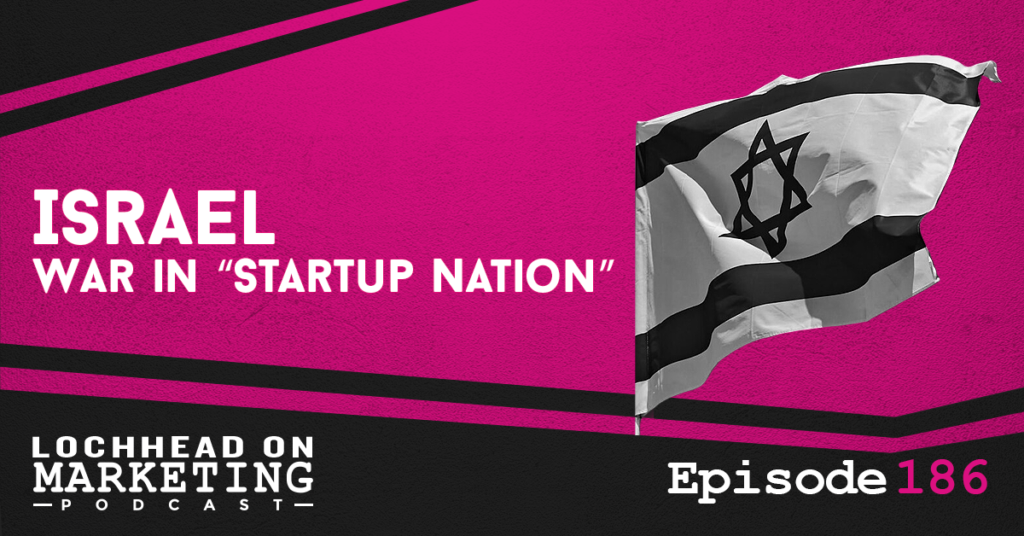
Podcast (lochheadonmarketing): Play in new window | Download (Duration: 11:23 — 7.8MB) | Embed
Subscribe: Apple Podcasts | Spotify | RSS | More
On this episode, let’s talk about Israel, and the war that has come to this “Startup Nation”.
Off the top, let me say the pain and suffering of what’s happening is unbelievable, unbearable. My heart goes out to Israel, all Israelis, and all Jews around the world.
I also want to say I have spoken with many Arabs since this happened. There’s a very big difference between an Arab or a Palestinian and Hamas. They are not the same thing. My Arab friends wanted to stress that to me. My heart goes out to all the innocent Arabs in Gaza and in the region who are suffering and also experiencing extraordinary pain and loss.
Israel is a “Startup Nation”
If you’ve been in tech for a while, you’ve probably worked with Israelis. For the better part of my professional life, I’ve worked with entrepreneurs, engineers and executives from the country.
The Israeli’s I know are smart, tough, driven, no-nonsense result producers. If you want to get big tech shit done, work with Israelis.
It has one of the highest concentrations of startups in the world. Its tech sector is a major contributor to the country’s economy. Tech is 18% of Israel’s GDP, and 14% of all salaried employees work in Tech. That’s roughly 500,000 people. On top of which, 50% of Israel’s total exports come from Technology developed by these people.
The framework Israelis created to co-locate Israel/US tech startups, established an innovation model that is envied the world over.
Israel has over 6,000 Tech Companies
The impact of this war borne out by the Israeli people.
Reports indicate that the start if this war was “the darkest day in Jewish history since the end of the Holocaust.”
And, it will also be felt by virtually every major tech company in the world.
There are over 6,000 tech companies operating in Israel, including some of the largest names, with Apple, Microsoft, Google, and Intel to name a few. These companies have a variety of strategic operations in Israel, including research and development centers, sales offices, and customer support centers.
Israel is home to over 15,000 startups, and they employ over 100,000 people. In 2021, Israeli tech companies raised a record $25.6 billion in venture capital funding.
Today, they are scrambling to secure and support their people.
15,000 Israeli Tech Startups
Now, this evil war is extracting an unbearable human cost. More death, suffering and disruption is sure to follow. And this war will be felt by many of us in the tech industry.
My heart aches for Israel.
My heart aches for all of the innocent souls in the Middle East.
We’re praying for peace, and the day we can all get back to building legendary companies.
To hear more of Christopher Lochhead’s thoughts on the recent events that unfolded in Israel, download and listen to this episode.
If you wish to join the conversation and get more information on the matter, check out Christopher’s post on LinkedIn:
We hope you enjoyed this episode of Lochhead on Marketing™! Christopher loves hearing from his listeners. Feel free to email him, connect on Facebook, Twitter, Instagram, and subscribe on iTunes!
185 Where Is Consumer Spending Heading? | Pirates Perspective
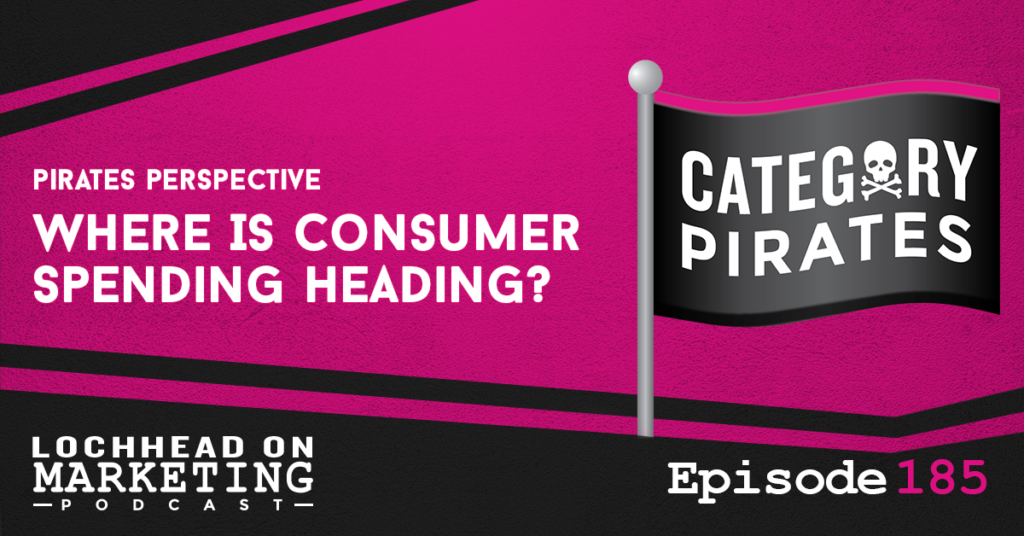
Podcast (lochheadonmarketing): Play in new window | Download (Duration: 18:22 — 12.6MB) | Embed
Subscribe: Apple Podcasts | Spotify | RSS | More
On this episode of Lochhead on Marketing, we are presenting some Pirates Perspective from our newsletter, Category Pirates about consumer spending trends.
Eddie Yoon, Christopher Lochhead and Katrina Kirsch of Category Pirates discuss the latest consumer spending reports and what they mean for the retail category and retail category queens. They also dive into a category opportunity for McDonalds and how it could impact the future of food delivery.
Welcome to Lochhead on Marketing. The number one charting marketing podcast for marketers, category designers, and entrepreneurs with a different mind.
The Changing Retail Landscape
Eddie Yoon examines the evolving economic landscape and its impact on U.S. consumers. Employing a Category Science lens, Eddie highlights significant disparities in economic indicators. Disposable personal income in July saw a mere 0.15% uptick, the year’s lowest, while personal consumption expenditures (PCE) surged by 0.82%, marking a 2023 high. This income-spending disconnect raises concerns.
Eddie notes the imminent return of student loan payments, averaging $503 per month, which may strain disposable income. Loan delinquencies, nearing 2020 levels, signal financial challenges. Notably, a fourfold increase in young adults aged 25 to 34 living with parents since the 1960s reflects economic constraints driving lifestyle changes.
Prompted by Christopher, Eddie also identifies two contrasting trends: robust growth in experiences and personal transformations versus declining interest in traditional goods. While international travel and categories like medical aesthetics flourish, traditional retailers like Target, Kroger, and Home Depot report declining revenues. Eddie predicts a future marked by consolidation and M&A, with only a select few brands and private labels surviving.
Navigating the Shifting Consumer-Driven Economy
Christopher Lochhead and Eddie Yoon then tackle the intriguing dual signals in the economy, driven by increasing digital influence on consumer behavior. On one hand, positive indicators suggest the American consumer remains a key economic driver, with retail sales growing by 0.6% in August and a forecasted real GDP growth of 3.5% for the third quarter.
However, Eddie Yoon emphasizes the underlying shifts: Consumers are driving economic growth through increased credit spending, but it raises questions about sustainability. Many are making significant changes in their financial habits, including declining college enrollments, reduced home purchases, and a lower birth rate, all contributing to a redefined economic landscape.
The trend toward single-person households, now at 29%, signifies a fundamental shift in the traditional nuclear household model. While the macroeconomic picture may still appear positive, these changes point to a significant remaking of the American economy, shaped by evolving consumer preferences influenced by digital transformations.
McDonald’s Dilemma
Christopher and Eddie then discuss McDonald’s recent announcement to phase out fountain drinks inside their stores by 2032, which highlights a significant shift in consumer behavior. Currently, 40% of their revenue is generated through app purchases, delivery, and drive-thru, indicating a decline in physical store visits. This trend reflects the changing preferences of Native Digitals, who prefer digital-first experiences and the conveniences they bring.
As consumers become more discerning and value experiences over material possessions, businesses need to adapt to these mega trends. Eddie Yoon points out that while some trends are favorable, like digital and app-focused sales, the shift in product mix poses challenges. McDonald’s heavily relies on the profitability of fountain drinks, which drive a substantial portion of their margins. However, the convenience of home beverages and changing consumer preferences may lead to a decline in the sale of large-size drinks at McDonald’s, impacting their profitability in this area.
To learn more about the Pirates’ solution to McDonald’s dilemma and more on consumer spending trends, download and listen to the episode. If you want to join in the discussion, subscribe to Category Pirates and find more Pirates Perspective buried around the beach.
Don’t forget to grab a copy (or gift!) of one of our best-selling books:
Snow Leopard: How Legendary Writers Create A Category Of One
The Category Design Toolkit: Beyond Marketing: 15 Frameworks For Creating & Dominating Your Niche
A Marketer’s Guide To Category Design: How To Escape The “Better” Trap, Dam The Demand, And Launch A Lightning Strike Strategy
 The 22 Laws of Category Design: Name & Claim Your Niche, Share Your POV, And Move The World From Where It Is To Somewhere Different
The 22 Laws of Category Design: Name & Claim Your Niche, Share Your POV, And Move The World From Where It Is To Somewhere Different
We hope you enjoyed this episode of Lochhead on Marketing™! Christopher loves hearing from his listeners. Feel free to email him, connect on Facebook, Twitter, Instagram, and subscribe on iTunes!

